
Storms in political teacups
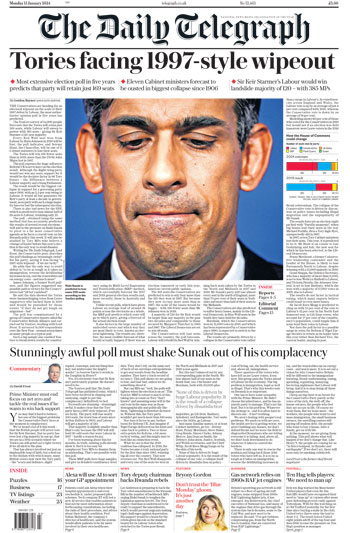
Does anyone really believe that the Conservatives will fight the coming general election under a new leader? The Telegraph appears to think they might. There was that Lord Frost poll predicting a Blair-plus landslide for Labour. And Simon Clarke crying “iceberg”. An interesting combination of natural phenomena for a paper that considers the earth quite capable of withstanding anything humanity throws at it, thank you very much.
“Appears” to think, I say. Not “does” think. There is little enough time for the party to reverse its fortunes before we go to the polls; a leadership contest would waste valuable weeks and exhaust public patience. No, it all feels like mischief-making by Frost (and others) to force a more right-wing agenda on the prime minister – Frost even goes so far as to list his demands: get even tougher on migration, cut taxes, junk the green stuff. Has Rishi Sunak time to do any of that? And even if he has, will anyone feel the effects before they vote?
Nah! He’s already on the campaign trail, making promises. This week about vapes. Next week, it’ll be something else. He hasn’t stopped promising since he took office. He’s got a promising and pledging habit. Like his Mexican Coke addiction. He’s apparently controlling the latter, but seems to need counselling on the former. Perhaps he could approach The Times’s Matthew Parris, who suggested a cure a couple of weeks ago: just get on with the day job – actually do a bit of governing – instead of going round telling people what you’ll do if they choose you to do some governing.

Still, the Express likes little more than a bit of Rishi pledging. It’s splashed on 14 prime ministerial vows, pledges and promises over the past two months, with justice for postmasters and forcing Royal Mail to deliver on Saturdays joining the usual migration and tax cuts. Add those to the Rwanda resignations and rebellions, plus the plotting and infighting occasioned by those two Telegraph landmines, and we reach a total of 21 lead stories focused on the Tory party, its aspirations and its aberrations since the beginning of December. Well, it’s a Conservative-supporting paper, what do you expect? It wants a Conservative government, it wants lower taxes, it wants to reduce migration.

But, I wonder, do its readers care that much about the plotting and the positioning? I’m thinking of Monday’s lead, “Kemi: ‘stirring’ Tory plotters must ‘stop messing around’”. I honestly don’t think they do (care, that is). They may be irritated by the posturing and share Parris’s desire that the government should focus on doing what it was elected to do. But Mr and Mrs Average Express Reader are not going to discuss election campaign strategy over their cornflakes, let alone Westminster bubble rumblings that will never come to anything.
And all this over a period when the King and the Princess of Wales have been in hospital for surgery and the Duchess of York has disclosed that she has skin cancer. This is far more natural territory for the Express, yet it has managed only four royal splashes over the past eight weeks – and two of those were about the latest Harry book. That’s only half as many as Caring Esther has achieved.

I’m not suggesting that Express readers aren’t interested in politics. They clearly are. But I struggle to see where the paper thought it was going with that Badenoch story, a dull rehash of the previous day’s TV interview with no value added and no discernible impact on readers’ lives. It’s a pretty basic requirement of an editor (a) to recognise whether readers will give two hoots about something and (b) whether it will ever happen, and to tailor the presentation in the light of those two factors. Even the Telegraph didn’t lead on its Simon Clarke exclusive.
Maybe the Express has found itself in thrall to those in the “corridors of power” and wants to feel “in the thick of it”. But there is a whole world outside of SW1. It used to drive me nuts when a Times night editor would ring the lobby and ask the political editor, “What are we splashing on?” Or the obverse, where the politicos would ring the backbench to say “Westminster is at fever pitch” over some threatened rebellion that would never end in a government defeat. In those days, The Times would lead on politics nine nights out of ten. Just about any Westminster story was a trump card to play against anything happening in any other arena. But it had a different readership from today’s Express. And I still remain to be convinced that even the Times’s stalwart readers needed to be force-fed so much parliamentary porridge.
Badenoch was right on one thing: the use of the word “stirring”. Because that’s what the hacks and the spads and the wannabe backbenchers do in the tearooms and the corridors. They work themselves up into a frenzy and truly believe that every single thing that happens there is hugely important. Some of it is. But if you treat every splutter as an explosion, where do you have left to go when something truly earth-shattering happens? We are in an election year, the phoney war has been raging for months; heaven knows when the first real shots will be fired. If the Express doesn’t want to bore its readers to death, it might like to keep its powder dry for when that day dawns.
Keeping tabs on Tory plotters
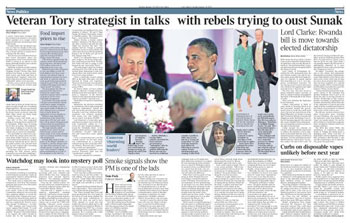
None of which to say there isn’t a place in our national prints for the “New Conservative” pot-stirrers and their fellow travellers. There is. On the inside pages, where the political nerds can drink their fill. Steven Swinford served up quite the brew on Tuesday, naming one Dougie Smith as a key figure in the movement to oust Sunak. Now there’s an interesting name. Smith used to work in No 10 for Boris Johnson with his wife Munira Mirza. Ms M quit after Johnson accused Keir Starmer of spending most of his time as DPP “not prosecuting Jimmy Savile”.
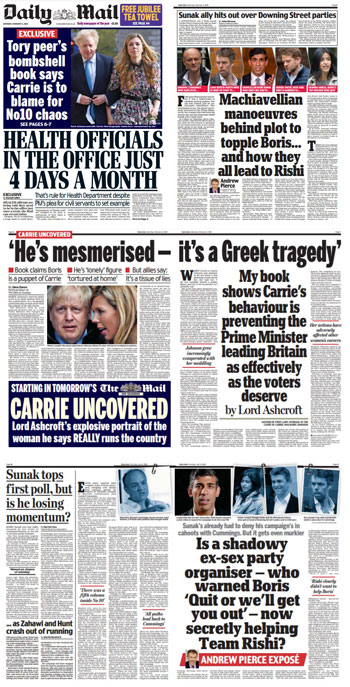
Back in July 2022, at the start of the race to succeed Johnson, the Mail carried an Andrew Pierce hatchet job on Sunak under the headline, “Is a shadowy ex-sex party organiser – who warned Boris ‘Quit or we’ll get you out’ – now secretly helping Team Rishi?” (Smith had apparently organised parties for swingers 20 years earlier.) This bore similarities to another Pierce effort from the previous February – when Downing Street had been “in chaos” in the wake of Mirza’s resignation – that was headlined “Machiavellian manoeuvres behind plot to topple Boris…and how they all lead to Rishi”. The Mail was not a fan of Rishi back then. It wanted to keep Boris in No 10 (in spite of its serialisation that day of a Lord Ashcroft book depicting him as Carrie’s puppet, living out a Greek tragedy) and when it failed in that, it wanted to keep Sunak out.
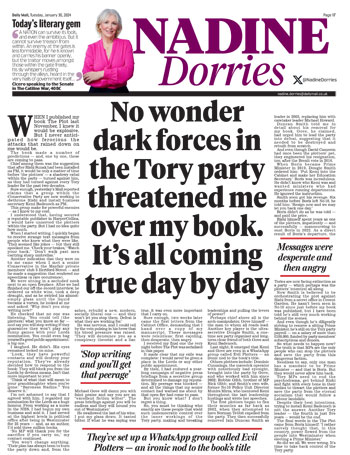
We shall revisit all the things the Mail had to say about Sunak another day, but for now, the most intriguing part of all this intrigue is that the arch anti-Boris, pro-Rishi plotter is now supposedly the arch anti-Rishi, pro-Kemi plotter. Is this feasible? Let’s ask Nadine. For this is where it gets surreal. Is it possible that not-Lady Dorries was right all along? She set out to square the circle in her Mail column on Tuesday, which also named Dougie Smith. Here was a man of such influence that he had “ordered” Johnson to appoint Badenoch education secretary. According to Dorries, “Boris was incredulous”. He didn’t know who she was and “ignored the instruction”. Smith “soon got his revenge” – telling Johnson more than two years later that he must resign, which he didn’t. Six months after that he “paid the price”.
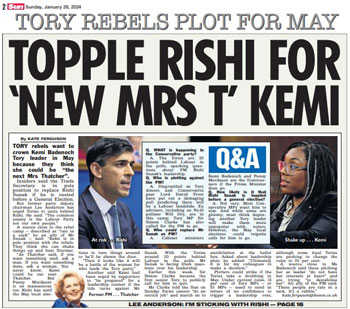
While for Pierce, all roads led to Rishi, for Dorries, all roads lead to Michael Gove. Who we know – courtesy of Tuesday’s Guardian – is in a WhatsApp group called Evil Plotters with Badenoch and who did, indeed, back Kemi for the leadership last time round. Meanwhile, the Sunday Sun was publishing a story headlined, “Topple Rishi for ‘new Mrs T’ Kemi”, which some are interpreting as an instruction from the supposedly retired proprietor. Now do we see why the Express was perhaps unwise to go down the road of splashing on “Kemi says stop plotting”?
The objective, again according to Dorries, is not simply to destabilise the sitting PM, but to destroy the party to force it to rebuild from the ashes. She says Iain Duncan Smith was also a target of these “dark forces” – which naturally included Dominic Cummings – as was David Cameron when the plotters “engineered” his resignation after the Brexit vote. (That is not quite my recollection – I seem to recall all the big Leavers wanting him to carry on to do the dirty work, and him whistling as he walked away, telling reporters, “Why should I do all the hard shit?” But Nadine doubtless knows better.)
What I do know is that it’s a rollicking read, that there probably is a nest of vipers in the background, and that Sunak will still be prime minister until he isn’t. And that will most likely happen when the country, rather than his party, votes him out.
Getting out the emigrant vote

Will that be this year? All the opinion polls suggest it will. But will it be a fair fight? The Mirror is stressing about rule changes that it interprets as the Tories trying to rig the election. From last week, Brits who have lived abroad (all the papers call them “expats” rather than emigrants, can’t think why) for more than 15 years will be allowed to vote in our elections. They will be able to register in the last constituency in which they were resident, but there are exceptions that lead critics of the change to suspect they will sign up in marginals, where their votes may have more impact.
On the face of it, this sounds alarming. People who haven’t lived here for yonks and don’t contribute to our economy having a say in how the country is run. What’s more, they’ll be allowed to give money to political parties and the ceiling for donations is being raised to £35m when no party other than the Conservatives has ever got close to the old limit of just under £20m.
It doesn’t take much imagination to conjure up a picture of wealthy pensioners living the life of riley on the Costa del Sol, Tory voters to a man and woman. Tut, tut! And talk about double standards! Didn’t the Mail accuse Starmer on successive days in May last year of plotting to rig our elections by planning to give EU citizens who live, work and pay taxes here. Yet it’s written nothing about this.

Hmm. Well, on the face of it, I know who’s side I’m on. Except it turns out that other countries also allow their émigrés to vote and other countries do not give non-citizen immigrants the franchise. Also, that change in the rules – passed by statutory instrument last autumn – was in the Conservative manifesto. Unlike many other policies, most notably Rwanda, the people actually voted for it, so it’s hard to argue against.

But the more compelling example of the dangers of jumping to conclusions came in The Times on Monday on a spread headlined, “Expats given the vote by Tories ready to punish the party over Brexit”. It cites academic research that shows that most expats registered to vote live in Europe and, contrary to the stereotype I offered above, are younger professionals who are fully integrated in their new countries. (I should have stopped to think for a moment – my dynamic nephew, his equally dynamic wife and their talented family scattered across Germany and Spain fall squarely in this category.)
Susan Collard and Paul Webb of Sussex university conducted polls of Brits living in Europe in 2015 and 2019 and found that the Conservative share of the vote slumped between elections and that 85% backed Labour or the LibDems when Johnson won his landslide. They carried out further polling in 2020 and said they had seen nothing since to suggest there would be a revival in Tory fortunes.
People lie to pollsters, particularly about whether they’re going to vote Conservative. The Times may be leaning towards Starmer, but it’s still a Conservative paper at heart. This could be seen as a rallying cry to get the Tory vote out – the Mirror says the party has already got a “vote co-ordinator” urging thousands of overseas voters to register in target seats. Or it could be a piece of counter-intuitive reporting, reinforcing Jacob Rees-Mogg’s rueful observation after that Labour move to give EU citizens the vote: “Parties that try and gerrymander end up finding that their clever scheme comes back to bite them.”
He gave as an example his own party’s decision to insist on voters having approved photo ID: “We found the people who didn't have ID were elderly and they by and large voted Conservative, so we made it hard for our own voters and we upset a system that worked perfectly well.”
Cancel culture

Dorries was not, of course, the only person to be disappointed in not receiving a peerage promised by Boris Johnson. Paul Dacre was similarly omitted from the honours list. Since then, his old paper has gone back to making a point that the House of Lords is full of unelected people. On Tuesday, this fact was jerked into the second sentence of a report on the Rwanda debate with as much subtlety as the BBC’s must-say “designated as a terrorist organisation by the UK government” every time it mentions Hamas.
But never mind the sour grapes, what jarred most about this report – and its headline “Stop preaching at us, Welby!” – was the implication that not being elected deprives you of your right to a view on anything. Which is pretty rich for a paper that is supposedly dedicated to free speech and an end to the woke cancel culture that stops people expressing an opinion with which you might disagree.
This was a classic “get your retaliation in first” approach to reporting: “The Archbishop of Canterbury was blasted by Tory MPs last night after he said the Rwanda scheme was leading the nation down a damaging path”.
How very dare he! Our most senior Anglican cleric contributing to a debate in our sovereign parliament. He should be stopped. As in “one MP even suggested the intervention meant it was time to review bishops’ right to take part in parliamentary debates”. Intervention? Doesn’t that imply a (possibly unwelcome) interruption, rather than a contribution to a discussion? And who is this MP whose censorious opinion takes precedence over what the archbishop actually had to say? We learn several paragraphs later that it was Tom Hunt, the MP for Ipswich.
Mr Hunt is a 35-year-old backbencher who has been in Parliament for all of four years, having previously worked as a researcher for Oliver Dowden and as chief of staff to the Mayor of Cambridge and Peterborough. He is, of course, entitled to have his say. But whether that say is of as much consequence as those of the Archbishop of Canterbury, the Bishops of London and Durham and, indeed, his own constituency’s Bishop of St Edmundsbury and Ipswich is another matter. All of these were quoted at some length, but not before the author David Barrett had asserted that Welby’s words had “triggered a furious response” from Tory backbenchers.
The only other Tory MP mentioned in the story was Lee Anderson, who suggested putting up asylum-seekers in Lambeth Palace. Meanwhile, the speaker whose words garnered the most attention elsewhere – Ken Clarke – was afforded one sentence to say that the Bill was a step too far and that he was unlikely to back it unless it was substantially amended.
This, for any Mail readers out there who may be interested, is what he said that didn’t make it into print: “They have decided to bring an act of parliament to overturn a finding of fact made by the supreme court of this country. And if we pass this bill, we are asserting as a matter of law that Rwanda is a safe country for this purpose, that it is always going to be a safe country for this purpose until the law is changed, and the courts may not even consider any evidence brought before them to try to demonstrate that it is not a safe country. This is a very dangerous constitutional provision. I always fear…about the risks of moving towards an elected dictatorship. The sovereignty of parliament has its limits, which are the limits of the rule of law, the separation of powers and what ought to be the constitutional limits on any branch of government in a liberal democratic society such as ours.”
Elected dictatorship, rule of law. One of the most respected Conservative politicians of his generation. But those words were not as important as Mr Hunt suggesting that bishops should be silenced.
There are occasions when the reaction to something is more newsworthy than the actual event or words that trigger the response. I would venture to suggest that it largely depends on the status of the person reacting in relation to the person who makes the initial assertion. If, for example, the education secretary were to call for the wholesale reintroduction of grammar schools and Sunak said No, a “Sunak slaps down Keegan” approach would be reasonable.
But that isn’t the way it works in Daily Mail land. It depends on who it thinks is on the right side of the argument. We saw this technique being used at its peak during the referendum campaign when Leave claims about all the benefits of Brexit would make a “straight” intro, loads of detail and then a bit of counter argument at the very end, while a Remain story would start off “Remainers were accused of…” much as that Welby story this week.

As a general guide, there are certain people who will usually be on the wrong end of this treatment.
The archbishop is one, Keir Starmer is another – he got it in the neck last week for “wading into” culture wars “on the side of the woke”, as though the leader of the opposition is treading somewhere he shouldn’t by making a speech defending the National Trust and the RNLI. But there’s one person who can always be guaranteed to be gainsaid with a “Look what nonsense he’s talking now.” You don’t need me to tell you who that is.
Hospital discharges

The King and his daughter-in-law both left hospital on Monday, so picking a front-page photograph wasn’t hard. You might think it would be even easier, given that the King came out of the front entrance with his wife, waving cheerily to the well-wishers and for the photographers, while the Princess of Wales had left earlier from a different door. Even the Guardian and the Independent – which, while it publishes online only, still produces a “front page” for press review purposes – had the King as their main image (the Sun was doing a number on Marcus Rashford).
Not the Mail. It had a photograph of Kate, Wills and the kids, taken as the family went to church at Sandringham at Christmas with a white-on-purple “Kate out of hospital – and reunited with her children after 14 days apart”.

The paper knows very well that readers are used to seeing the princess looking good in all circumstances, not least almost immediately after the birth of all three of her children. Did it calculate that, if only for a moment, they would think this was a live picture? Or doesn’t it matter? Just any picture of the golden family looking radiant will sell papers and is therefore preferable to the news shot of the monarch doing his bit to advertise the importance of older men getting their prostates checked out. The princess continued to take precedence inside, where she was “Doing well…Kate’s finally home with her family after abdominal surgery”, while her father-in-law was nothing more than an afterthought: “and the King’s delighted to be discharged too!”
All those splashes on that very subject over the years about men dying of embarrassment and here was the perfect opportunity to ram the message home. What a miss!
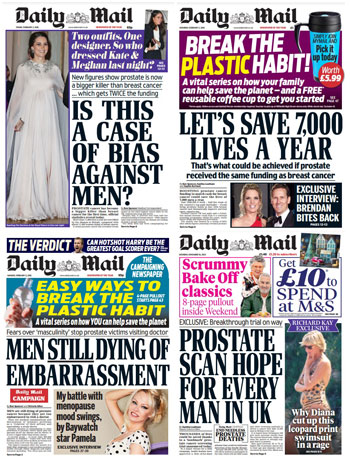
Over at the Telegraph, royal editor Hannah Furness wrote that the contrasting hospital exits spoke volumes. This piece pointed up the difference in the PR operations: the front and back doors, both for patients and visiting spouses, the level of detail released about their conditions. All of this was worthy of remark. But whether those differences actually told us anything other than the fact that they weren’t the same is questionable.
What has been interesting is the level of discretion the press has shown with regard to Kate. Maybe there were paparazzi round the back when she left on Monday, but if there were, they found no takers for their wares in the nationals. There has been a lot of sympathising and empathising – “how awful to be separated from the kids for so long”, “when I was in hospital…” sort of stuff – but, apart from one doctor in the Mail, virtually zero speculation as to what surgery she had undergone. Is this deference, the result of some kind of pact, or an outbreak of responsibility? Wouldn’t it be just wonderful if it were the latter?
The stars of the audience

The Mail had gone off-piste with its front-page picture the day before as well. In this case, it chose a full-drop photograph of Hannah Waddingham in a stunning blue satin trouser suit with the headline “Hannah’s a Plaza Suite treat! See page 3”. The caption said simply “Opening night: Hannah Waddingham yesterday”. I know it’s remiss of me, but until I googled her just now, I had no idea who Ms Waddingham was. And the Mail wasn’t in the business of enlightening me.
For when I turned to page 3, I found a review of Sarah Jessica Parker and her husband Matthew Broderick appearing on the London stage in a new interpretation of Neil Simon’s Plaza Suite. This was, by all accounts, quite the event, with members of the audience paying up to £300 a seat. Two pars from the end, we learn that their number included “TV favourite Hannah Waddingham”.
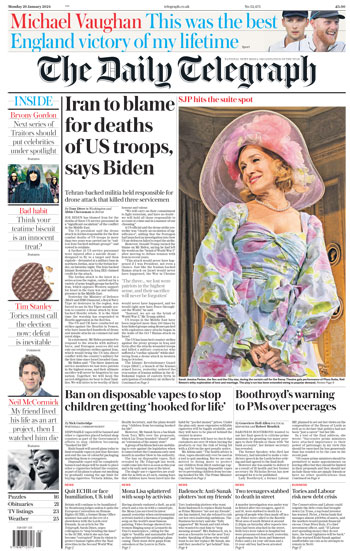
The production also earned a front-page nod from the Telegraph (where SJP was the main picture) and the Guardian, where the leading couple made the puff. Big-name American stars on British stages do tend to command press attention and there were reviews across the spectrum.
What struck me, though, were the verdicts on their performances. The Mail’s Patrick Marmion gave them five stars, while the Guardian puff said it all with “Two stars and a two-star review”. Joan Marcus in the i agreed, while the Times, Telegraph and Express critics all enjoyed themselves enough to award the show four. I’m baffled that there should be such a strong difference of opinion.

But not quite as baffled as I was by the Express headline referring to “Jessica Parker”. Did the sub think it was a double-barrelled surname? Or maybe they were as ignorant of the Sex and the City star as I was of the Game of Thrones Emmy-award-winning Ms Waddingham.
Reopening old wounds
Reopening old wounds # 1: Picture choices

I seem to be hung up on the Mail’s picture choices this week. Yesterday, it was not so much the photograph that concerned me as its presentation. Here was Constance Marten with her almost-newborn baby, a still from a video showed to an Old Bailey jury, under the headline, “Dramatic first pictures of aristocrat with baby she is accused of killing”. Dramatic? Is that really the word for these circumstances? First pictures? Had there been a clamour from the public for images of the infant? Was there a race to be first to publish? If so, the Mail tied with every other medium.
Readers were then invited to turn to pages 8-9, to be met with a variation on the same theme: “First dramatic pictures of baby with off-grid aristocrat”. And, at the foot of the spread, a huge puff for the Mail’s podcast The Trial – find it on Spotify and Apple. Well, at least it wasn’t over the top of the front page as it had been last Friday, when the paper splashed on the opening of the case in which Marten and her partner Mark Gordon are accused of killing the baby through gross neglect.
I have commented before on the Mail’s screaming marketing of the podcast in previous cases, notably that of Lucy Letby. But the editorial coverage, while strident, sort of conformed to some kind of norm. This time, the paper seems to have lost all semblance of humanity. I am not questioning that this is an extraordinary case, worthy of a tabloid splash and a lot of press attention. It is absolutely heart-rending. But these are real people, not fictional characters in a TV crime drama. That baby in the buggy lived and breathed, for all too short a time. She was not an accessory or a prop. It’s time the paper remembered that.
Reopening old wounds # 2: Beastly French treating us like non-EU citizens

Last November, the Telegraph ran a front-page story about a “boost” for Brits with second homes in France who had been “punished by Brexit”. There was a chance that they would be granted extended visas, so they could stay up to 180 days a year, twice as long as other non-EU nationals. The move didn’t have the support of President Macron and I was doubtful that it would come to anything.
I was wrong. The following month, the French parliament did indeed pass the law. Celebrations all round in the British press.
Premature celebrations, it turns out. Last week, the French courts threw out the change as “unconstitutional”. So we’re back to where we were at the beginning of the autumn.
The story has largely been confined to the travel pages, which is what you’d expect. It didn’t trouble the Express print editions at all at any stage. But the website was interested. Last month, it reported the law change as a “Victory for Brexit Britain” and a humiliation for Macron. This “massive win” was in part down to the King’s recent state visit. So, this was the story that had it all: a victory for the Brits over the French, royal input and proof that Brexit wasn’t as damaging as everyone said it would be.
After last week’s ruling, though, the Express was back to being cross with the EU. Brits were being treated like citizens of any other non-member country. If they overstayed the 90 days, they would be banned from every country in the bloc. They had to queue at the border, get their passports stamped, and would soon have to apply for travel authorisation documents. They were being “forced” to sell their homes. It was “hell”. They had lost their freedom of movement.
But wasn’t that exactly what the Express campaigned for all those years?
Reopening old wounds 3: Like a dog with a bone
The Sun’s tally of Kyle Walker splashes since last March year reached ten. The total for postmasters remains at one.

Front page of the fortnight

This was a great exclusive for the Sunday Express. Whether it comes to anything remains to be seen. But it was good to see the paper produce a fine front page on a subject way off its usual agenda.
Treat of the week
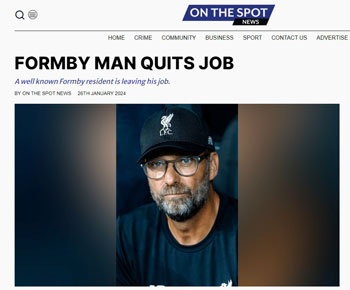
Came from the On the Spot website in Southport. This is how to take a story that makes every national front page and turn it into a local gem.
I reproduce it in full:
A Formby resident has announced he is quitting his highly-paid managerial role, sparking scenes of mourning and making international headlines in the process.
A popular figure around the village, the Freshfield resident, who locals know on first-name terms as “Jurgen” handed in his notice in November, but the news has only just made the public domain.
While resignations aren’t often newsworthy, this particular announcement will come as sad news for patrons of the Freshfield Pub, where the recognisable figure is a regular drinker.
A known football fan, he has also been known to observe local junior league football games in Formby while out walking his dog.
Liverpool Football Club are now undertaking a search for a new manager.
Sadly, there is no byline.
Liz Gerard’s Notebook is a fortnightly column published in the InPubWeekly newsletter. To be added to the mailing list, enter your email address here.












